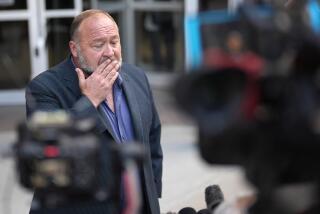A Real Estate Riches to Rags Tale : Best-Selling Investment Author Tells Bankruptcy Hearing How He Went Broke
- Share via
A few years ago, author Albert J. Lowry built a fortune telling people how they could get rich quick. Last Friday at a bankruptcy hearing, he told his creditors how he went broke.
Lowry, a Westlake Village resident, was one of the first of the real estate investment gurus popular in the late 1970s and early 1980s, hitting it big with the best seller “How You Can Become Financially Independent by Investing In Real Estate.” But at the hearing in Ventura, a dozen attorneys and creditors listened as Lowry explained what happened to millions of dollars in real estate he once owned.
The hearing marked the first public explanation by Lowry, 60, of his deteriorating financial condition since he filed on May 13 to liquidate his personal assets under Chapter 7 of the U.S. Bankruptcy Code.
Wearing his curly toupee and wire-rim glasses, Lowry came to the hearing dressed in a dark blue suit, but shed his coat before being questioned by bankruptcy trustee Lawrence A. Diamant.
When he filed his bankruptcy petition, Lowry listed assets totaling about $1 million and debts of nearly $3 million. He also filed documents showing that his expenses exceed his income by $1,500 a month.
Under questioning by Diamant, Lowry said he transferred some real estate to his ex-wife, Darlene, as part of an informal settlement they made in 1985 while separated, before their divorce. Lowry said he kept his businesses, royalties from books and cassette tapes, and his Westlake Village home.
In a 1985 loan application, Lowry had listed his net worth at $12.1 million.
But some of Lowry’s creditors have alleged that he transferred property to Darlene before their divorce was final to keep the property out of the hands of creditors.
When pressed by Diamant, Lowry acknowledged that the agreement to divide the property and businesses was oral and not part of any formal, court-approved property settlement in the divorce, which became final earlier this year.
Lowry added that Darlene kept their property records, and frequently said he did not recall details on what she received in the agreement or how much money she has received in selling some of the real estate.
Among the businesses Lowry said he received in the settlement was a failing company called The Lowry Group, later renamed Success Development Institute. Lowry said he believed the Westlake Village firm that promoted his books and tapes could be turned around even though it had more than $2 million in debts and only about $50,000 in assets.
Success Development collapsed in October, 1985, under pressure from creditors. In previous interviews with The Times, Lowry repeatedly said he cut his ties to the firm nearly two years before it collapsed, although state records listed him as heading the company.
Lowry said he received $600,000 in 1985 from Darlene after she sold their interest in a Pennsylvania restaurant. He said he gave the money to The Lowry Group to help it pay its bills.
Lowry told Diamant he believes that his Westlake Village home, which he said he bought in 1983 for $750,000, is worth more than $1 million. But the man who advised others how to find real estate bargains said that a softening in the home resale market has made it difficult to get that price. Lowry recently cut the asking price of the home, originally listed two years ago at $1.15 million, from $945,000 to $895,000. Lowry confirmed that he has a $680,000 loan on the home.
The hearing is likely to be the only formal, public forum on Lowry’s bankruptcy case, although attorneys may elect to question him further in deposition-like hearings. Creditors said that because of the complexity of the financial case, there is no telling how long it could take to resolve the case or for creditors to be paid off.
Lowry told Diamant that the royalties he receives for his books and tapes have dropped sharply. “I don’t think I’ll receive too much” this year, Lowry said, noting that he has received only $4,000 so far, compared to $80,000 annually in 1985 and 1986.
During the hearing, Diamant repeatedly reminded Lowry not to spend any royalties he receives, but to instead turn them over to his attorney so they can be turned over to Diamant.
“It doesn’t belong to you anymore,” Diamant said firmly.
More to Read
Inside the business of entertainment
The Wide Shot brings you news, analysis and insights on everything from streaming wars to production — and what it all means for the future.
You may occasionally receive promotional content from the Los Angeles Times.










